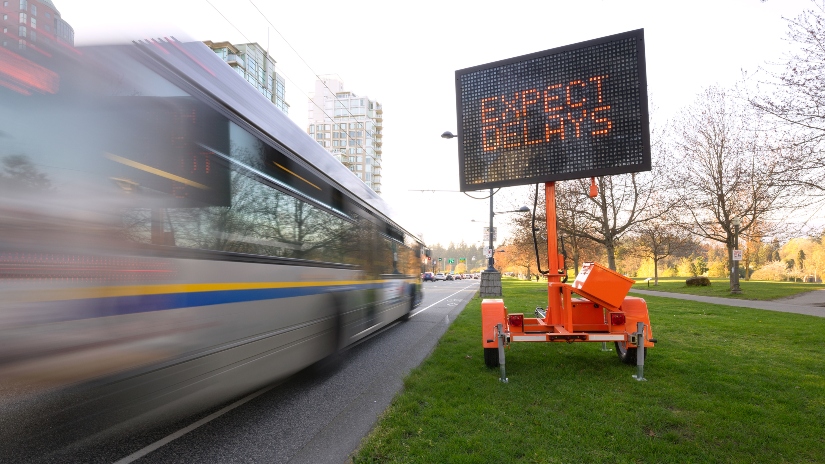Infrastructure has taken center stage in the national debate about the future of transportation in the United States — and, by extension, the future of transportation equity and environmental responsibility.
In November 2021, President Joe Biden signed the Infrastructure Investment and Jobs Act1 into law. This legislation defines the nation’s infrastructure priorities and allocates funding to improve the delivery of clean water, expand high-speed internet and upgrade the U.S. power infrastructure. In addition, there’s a large focus on improving the nation’s outdated transit systems, from rebuilding roads and bridges to investing in public transit and building out a national network of electric vehicle (EV) charging stations. Efforts are also underway to enable desperately needed capital projects for rail and transit authorities.
As these initiatives move forward, it is increasingly becoming clear that government and industry must work together to bring these transportation objectives to fruition. To support government leaders in making the most informed decisions for their constituents, public-private partnerships (PPPs) can play a crucial role in driving sustainable transportation innovation that will be instrumental in preparing the country for a brighter future of mobility.
In this article, we’ll explore the key opportunities and challenges that face the American mobility industry today — and how PPPs can lead the charge forward.
To promote the widespread adoption of electric vehicles, PPPs can play a crucial role in the development of America's electric vehicle charging infrastructure. Expanding the power grid is the first step to ensuring that electricity generation and distribution is adequate to power the electric transportation systems of tomorrow. This is true both in major urban areas and in regions where rural communities now lack sufficient access. PPPs will need to invest in this infrastructure not only to meet increased demand but also to meet the environmental goals set forth by the mobility industry.
Electrical power generation and distribution systems will need to become smart, secure and capable of evolving with technology and consumer needs. These changing conditions include shifts in demand for electricity and mass transportation, the advance of smart systems, and environmental imperatives as they develop. Regulations and technologies will change to keep pace, making it essential for policymakers and private industry to combine their expertise and partner on solutions with the greatest impact and best benefits for society.
PPPs can lead the call for investments in smart corridors and the construction of a connected infrastructure in support of smart vehicles, traffic signaling and cellular-to-vehicle technologies. From autonomous and connected vehicle technologies to advances in edge technologies and analytics, private companies have the expertise to construct the infrastructure needed to achieve government environmental and Build Back Better2 objectives. Some proposed infrastructure initiatives even support decarbonization efforts by providing more environmentally responsible transportation options.
Technology is already enabling more intuitive, consumer-friendly solutions to longstanding concerns. For example, software, Internet-of-Things (IoT) sensors and mobile applications now assist travelers in finding parking, paying for parking or tolls, and mapping out their journeys. Next-generation transportation infrastructure will rely heavily on technology to help consumers make more sustainable choices and decrease their carbon footprint. PPPs can leverage the combined resources and technological expertise of both the public and private sectors to create a more sustainable mobility ecosystem that meets the needs of tomorrow's smart cities.
Legislative support can already be seen for these initiatives. In October 2021, Representative Haley Stevens (D-Michigan) spoke with Hitachi, where she highlighted how PPPs are “providing a platform for us to co-invest on large, big opportunities — not only necessarily challenges, but opportunities…. I continue to be very enthusiastic about where we're moving with digital, what this means for our workforce and how we can continue to inspire — and accelerate — our future as it unfolds before us today.”

Autonomous vehicle (AV) manufacturers must develop capabilities in tandem with safety standards to optimize utility, comfort and efficiency. To keep pace with the evolution of mobility requirements for decades to come, both Hitachi experts and congressional leaders agree that AV technology must be supported by innovative infrastructure built to adapt swiftly to changing conditions. In fact, Representative Rodney Davis (R-Illinois) shared with Hitachi that the “best thing any committee in Congress can do to spur innovation is get the heck out of the way. Let the private sector continue to do what the private sector does best: innovate.”
Among Hitachi’s priorities in product development in this arena is a particular focus on improving vehicle performance for a higher level of autonomy. The company’s work encompasses such elements as multisensor fusion and automotive-grade, high-performance computer environments capable of data processing and decision-making. Hitachi is also a key player in designing how AVs communicate with beacons, another area in which government and industry must come together to ensure that systems are available and resilient.
PPPs can assist in advancing analytics capabilities as they pertain to mobility services. This includes making full use of 5G and blockchain as key enablers in delivering value to citizens.
Hitachi is working to integrate data from vehicles and third-party providers — such as those that deliver updates on traffic, weather or road hazards — to improve safety and optimize the EV’s energy management. Advanced analytics can also create a frictionless, multimodal experience for consumers using public transport. Optimized scheduling, for example, can help passengers move smoothly between transit stops and between different transit systems without having to stop to pay each provider.

With critical, connected infrastructure and an abundance of software technology, transportation systems provide a significant attack surface. Government and industry can partner to find a balance between connectivity and security.
As we increasingly rely on data and machines to make decisions, data privacy must also remain a key consideration. In many cases, the current infrastructure was not designed to protect against today’s data breaches and privacy violations. PPPs can ensure that resources are committed to develop impenetrable cybersecurity systems and procedures for the threats of today and those of the future.
In order to fortify against present and emerging cyber threats, PPPs can collaborate with companies such as Hitachi, which not only possesses expertise in innovative transportation and green mobility solutions, but also in cybersecurity, compliance, and data privacy.
Public-private partnerships in transportation are on the rise, benefiting the mobility sector globally amid the climate crisis. Through the power of PPPs, the U.S. can play a pivotal role in developing a resilient and sustainable transportation infrastructure. Together, government and industry can create an ecosystem that will underscore our global competitiveness and leadership in green technologies.
Hitachi’s demonstrated commitment to social innovation and promoting green mobility leverages advanced technologies to enhance quality of life around the world. A leading partner in many PPPs, Hitachi is working with its partners to forward technologies that advance transportation for everyone in America. Private and public sector partners such as Hitachi are powering good across the country — making life better and more equitable for all.